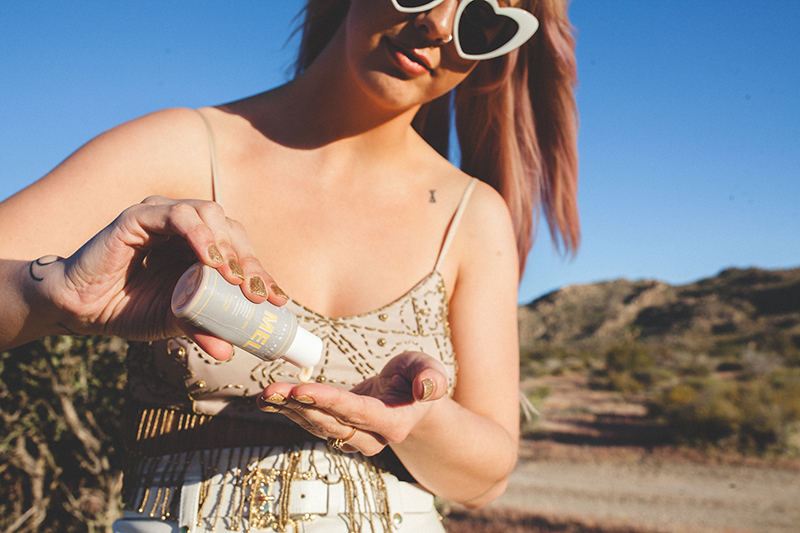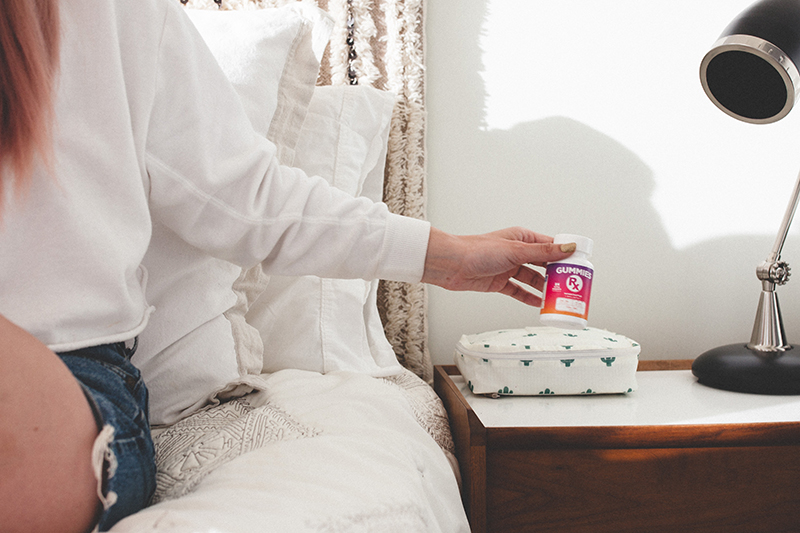Understanding CBD
By: Angela Viesti
Is it just me, or is everyone and their grandma trying to pick your brain about CBD? I field questions from people who catch wind of my experience with cannabis and hemp all the time and a few things are clear:
People want to be more health conscious.
People want natural alternatives.
People want to make informed decisions.
CBD was once an unknown miracle healing elixir that treated serious medical conditions like cancer, epilepsy, and autoimmune disease, and has now transformed the way we manage our health and what we look for in wellness and beauty products.
In the age of infographics, pseudo-science, and fake news, it’s hard to know what to believe and what to buy. So we thought we’d help you better understand CBD and the ways it’s being used. Read on for answers to some of the most common questions we get about CBD.
What is CBD?
CBD, the common name for cannabidiol, is a cannabinoid found in the flowers of cannabis and hemp plants. Cannabinoids are chemical compounds naturally produced in plants and mammals that interact with the body’s endocannabinoid system (ECS). Synthetic cannabinoids that mimic CBD and THC (tetrahydrocannabinol) have been formulated and studied by pharmaceutical companies, typically as isolated compounds.
CBD is famous for being a powerful, multifaceted component of cannabis, some of which are:
Anti-inflammatory
Neuroprotective (see Government Patent #6630507)
Anti-anxiety
Antibacterial
Anti-acne
Antiepileptic (reduces seizures and convulsions)
Antispasmodic (reduces muscle spasms)
Antipsychotic
In addition to its medical applications in treating seizures, chronic pain, addiction, and diseases like Multiple Sclerosis and HIV/AIDS, CBD is now seen in fashion and beauty magazines, found at natural food markets, major retailers, and drugstores. It’s even being incorporated into the latest beauty products and wellness services.
A majority of the side effects that come with consuming CBD are actually positive and can lead to improved long-term health, sometimes even with diminished use. The presence of CBD in the body can increase the efficacy of some prescription drugs which equals taking less medication and experiencing significantly fewer side effects.
DISCLAIMER: Always consult a physician or qualified health professional with questions about a specific condition or medication.
Is CBD Addictive?
CBD is not addictive, and in fact, animal studies have suggested that CBD has the opposite effect on the brain’s mesolimbic dopamine pathway--aka the “reward system” part of the brain--that drugs like methamphetamine have. The World Health Organization (WHO) published a report in 2018 that concluded CBD has low potential for abuse and cited a number of pre-clinical studies showing promising therapeutic applications of CBD to treat opioid and tobacco addiction. More research is desperately needed, of course, but these early studies offer optimistic potential.
While this 100% has my support and is obviously a step in the right direction for addiction treatment and the cannabis/hemp/CBD movement, the hypocrisy of how little care there was for addiction and crime during the height of the drug war mustn’t be overlooked. Of course, it was poor communities and communities of color that were disproportionately impacted. Only now that the middle class is being affected by drug abuse, addiction and overdose do the media, the general public, and those in office express concern for addiction on a mass scale.
We must examine this pattern and shine a light on it so that it’s not repeated.
How Does CBD Make You Feel?
I question I hear often is, “How does CBD make you feel?”
Not high, for one.
Its multi-generational appeal is due to its non-intoxicating nature, making it friendly to the young, the old, and the high-averse sectors of the population. THC is a potent compound that amplifies and is amplified by CBD, but it can be too much for some people. CBD can act as a gateway to the exploration of cannabinoid therapy, resulting in more acceptance and interest in cannabis on a wider scale.
CBD can make you feel less anxious, too. Anxiety is often a trigger for unhealthy behaviors like heavy drug and alcohol use and pleasure seeking behaviors that can cause unwanted negative outcomes. CBD’s anti-anxiety properties have the effect of lowering blood pressure and curbing cravings--hence it’s propensity to treat addiction.
One of the reasons CBD is so widely sought after is for its analgesic properties. Pain impacts us all and although there are plenty of pain-relieving drugs on the market, most are made of synthetic materials and harmful chemicals. Side effects from pain killers range from upset stomach to liver toxicity and even overdose. Since CBD relieves local pain when applied topically and systemic pain when ingested orally, and is non-toxic with no negative side effects, it’s fast becoming a staple in the average medicine cabinet and even among athletes, fitness professionals and in physical therapy settings.
Another star quality of CBD is its anti-inflammatory properties. Inflammation isn’t inherently negative, as it’s your body’s response to perceived threats. However, if your body’s constantly combating systemic inflammation, its energy is being overutilized. This can cause lethargy, feeling like you’re in a slump, and low energy, if you’re otherwise healthy. Inflammation can be detrimental to the health of those with chronic illness, cancer, and weakened immune systems. Adding daily doses of CBD alongside an anti-inflammatory diet helps to support bodily functions and maintain homeostasis.
How is CBD different than Hemp Seed oil?
This is a big one. Most people who ask me this don’t even know there’s a difference between CBD and hemp seed oil until I read the ingredients on the product they’re showing me and point it out to them.
Simply put, the difference between CBD oil and hemp seed oil is that CBD oil is the concentrated compound extracted from cannabis and hemp flowers, while hemp seed oil is the oil extracted from hemp seeds. The former contains cannabinoids, the latter does not.
Hemp seed oil is versatile and packed with aminos, vitamins, fats, and proteins, making it an excellent ingredient in health products. It does not, however, contain cannabinoids--which is fine as long as the customer buying it knows this. Many mainstream brands using cannabis leaves in their marketing fail to educate their customers about the difference between CBD oil and hemp seed oil.
Some brands seem to intentionally mislead the public, taking full advantage of the CBD craze. The average person who sees “cannabis-sativa seed oil” on a product label thinks they’re getting cannabis or CBD and don’t realize that this product contains no CBD. I’m sure this scares a fair amount of people away too. All the more reason to be transparent.
What Are the Most Beneficial Ways to Use CBD
CBD has a broad range of uses and therapeutic benefits. There’s no single “right way” to use it, but there are some tactics you can apply to get the most out of your CBD intake.
The wide spectrum of possible applications makes CBD seem like a cure-all medicine, which can be a dangerous assumption to make. It’s important to consider your health holistically and integrate CBD into your routine. To neglect your health and blindly rely on CBD (or any other medicine) to save you in times of illness is a terrible mistake. CBD can help support your health and wellness goals as part of a balanced regimen of nutrition, movement, rest, learning, and pleasure.
Follow this step-by-step guide for beginning a CBD regimen:
Start by identifying everything you want to heal. This can be things like nausea, pain, anxiety, insomnia, PMS symptoms, etc.
For one week (or at least one full day if you can’t wait) before you begin taking CBD, document how you feel upon waking, what/when you’re eating and how you feel before and after meals; how much exercise/movement you’re getting and how you feel before and after; detail your emotional state, especially if there are extreme highs and lows; make note of anything related to the things you listed in step 1.
Determine which CBD products you want to try. If you don’t know where to start, I’d suggest a CBD tincture, like Bare, or a CBD Gummy to allow absorption throughout your bloodstream and lymphatic system most efficiently.
Once you begin, document the same factors from step 2 every day for two weeks. At the end of two weeks, you should have an idea of whether or not you need to increase your dose or add something else to your regimen.
Don’t get discouraged! Stick with your regimen for at least 30 days after starting and after each modification. Review your notes biweekly to gauge progress and setbacks.
CBD is an excellent alternative to chemical, man-made products that don’t heal you and don’t integrate into a healthy lifestyle. Let me know how CBD has helped you via email or by tagging @HybridHealing, @KushQueenshop and @kushqueenco on Instagram!
Looking to try out some new CBD products? Shop Kush Queen below!







